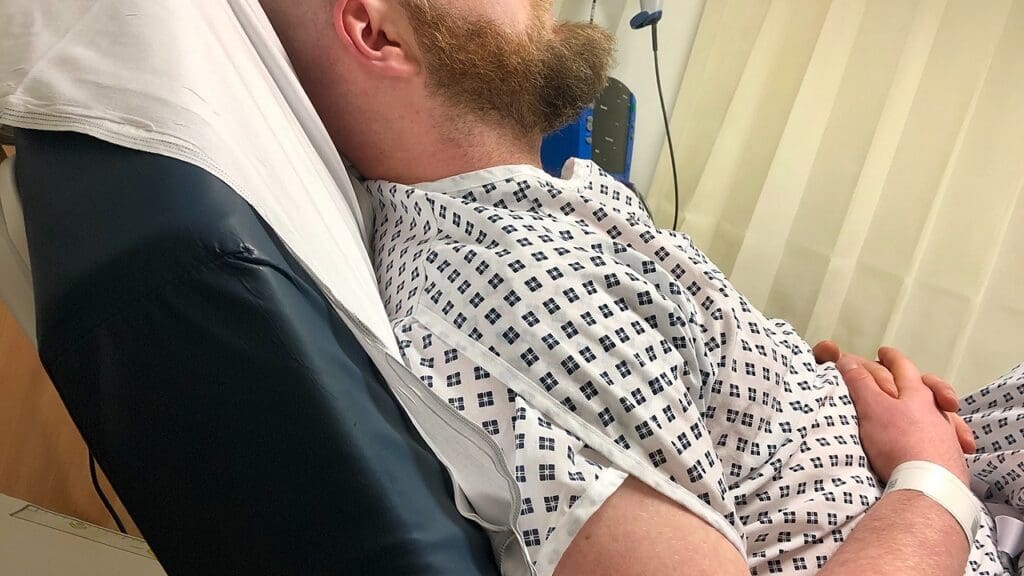
Waking up from a coma is a big step, starting a tough recovery journey. At Liv Hospital, we know the challenges and unknowns of this life-changing process. Our team works hard to give full care, helping patients with physical, mental, and emotional changes.
Studies show that about 40 percent of people with traumatic brain injuries can fully recover. With new medical treatments and rehab programs, we help patients get stronger and more independent. We guide them with care and knowledge through their recovery.
Key Takeaways
- Regaining consciousness is just the beginning of the recovery journey.
- Patients face significant physical, cognitive, and emotional changes.
- Comprehensive care is key for supporting patients through recovery.
- Advanced medical treatments and rehab programs help regain strength and independence.
- Outcomes vary, but nearly 40 percent of traumatic brain injury survivors can make a full recovery.
Understanding Comas: More Than Just Deep Sleep

A coma is a deep, long-lasting sleep-like state. It’s different from regular sleep or other unconscious states. It happens when the brain can’t work right because of a serious injury or illness.
It’s important to know what makes someone fall into a coma. Also, how comas are different from other unconscious states. This helps in giving the right care.
What Causes Someone to Fall Into a Coma
Comas can come from serious medical problems. These include head injuries, strokes, or brain infections. What they all have in common is they badly hurt the brain’s function.
How Comas Differ From Other Unconscious States
Comas are not the same as other unconscious states. For example, vegetative states or minimally conscious states. The main difference is in how awake someone can be and how they react to things around them.
People in a vegetative state might wake up sometimes but not really be aware. Those in a coma stay asleep all the time. Knowing these differences is key for the right diagnosis and care plan.
The Science Behind Consciousness and Coma Recovery

Coma recovery is a complex process. It involves understanding consciousness and brain activity. We assess brain function and measure awareness and responsiveness.
We use advanced tools to monitor brain activity in comatose patients. This includes checking electrical activity and responses to stimuli.
Brain Activity During Comatose States
Research on COVID-19 patients shows the need to understand brain activity in comas. Our team uses EEG and other methods to analyze brain waves. This gives us insights into the patient’s neurological status.
Measuring Awareness and Responsiveness
It’s key to measure awareness and responsiveness to track patient progress and make treatment decisions. We use scales and tools to check consciousness. This includes how well they respond to commands or physical stimuli.
By monitoring these closely, we create treatment plans tailored to each patient. This boosts their chances of recovering from a coma.
Can You Breathe in a Coma? Bodily Functions During Unconsciousness
People in comas often wonder about their body’s functions, like breathing. In a coma, the body’s automatic actions, like breathing, can change. We’ll look at how comas affect breathing and other key body functions.
Autonomous vs. Assisted Breathing
Coma patients can breathe differently. Some breathe alone, while others need assisted breathing from machines. The need for help breathing depends on the brain injury’s severity and the patient’s health.
Is Coughing in a Coma a Good Sign?
Coughing helps clear airways and is a natural reflex. In coma patients, coughing shows some brain activity. A strong cough can mean the brain is working a bit. Our team watches these signs closely to help decide treatment.
Other Reflexes That Remain Active
Coma patients might also have active reflexes like swallowing and gagging. These reflexes help us understand their brain’s state and guide their care. We use a detailed approach to watch and support these functions, aiming for the best results for our patients.
It’s key to understand body functions in coma patients for proper care. The Traumatic Brain Injury Resource Directory shows how important this is for managing coma patients well.
Signs That Someone Is Beginning to Wake Up from a Coma
Waking up from a coma is a complex process. It shows distinct physical and neurological signs. As patients start to wake up, several early signs show how they are doing.
Early Physical Indicators of Recovery
One of the first signs is the return of basic bodily functions. Patients may start to show spontaneous movements, like twitching or slight limb movements. These movements are important because they show the brain can send and receive signals to muscles.
The Significance of Eye Movement and Reflexes
Eye movement is another key indicator of recovery. Patients may start to open their eyes, track movements, or respond to visual stimuli. These reflexes are vital signs that the brain is getting better. Medical teams watch these changes closely to see how the patient is doing.
Responding to Stimuli and Commands
As patients get better, they may start to respond to things outside themselves, like verbal commands or touch. This is a good sign that they are coming back to life and getting their thinking back.
| Indicator | Description | Significance |
|---|---|---|
| Spontaneous Movements | Twitching or limb movements without external stimulus | Indicates brain-muscle signal transmission |
| Eye Movement | Opening eyes, tracking movements, or responding to visual stimuli | Signifies regaining brain functionality |
| Responding to Stimuli | Reaction to verbal commands or physical touch | Shows regaining consciousness and cognitive function |
By watching these early signs, doctors can understand how a patient is recovering. They can then adjust the care to help the patient get better.
The Stages of Emerging From Unconsciousness
Coming back to consciousness is a complex journey. It includes stages like minimal consciousness and vegetative state. Knowing these stages helps healthcare teams help patients and their families.
Minimal Consciousness vs. Vegetative State
People in a vegetative state seem awake but don’t show any awareness. On the other hand, those in minimal consciousness might respond to some stimuli or follow simple commands, but not always.
Transitional States of Awareness
Patients move through different states as they get better. These states show growth in awareness and how well they can respond. Each person’s journey is unique.
Timeline Expectations for Recovery Phases
The time it takes to recover varies a lot. Here’s a table that shows the usual phases and how long they last.
| Recovery Phase | Typical Timeline | Characteristics |
|---|---|---|
| Vegetative State | Days to Weeks | No awareness or responsiveness |
| Minimal Consciousness | Weeks to Months | Inconsistent awareness and responsiveness |
| Full Recovery | Months to Years | Regaining full awareness and functionality |
Understanding these stages and their timelines helps healthcare teams support patients and their families during recovery.
First Key Change After You Wake Up from a Coma: Confusion and Disorientation
When someone wakes up from a coma, they often feel confused and disoriented. This is a key part of getting better. They start to notice their surroundings and connect with family and friends again.
Why Memory Gaps Occur After Coma
Memory gaps are a big challenge for coma survivors. The length and depth of these gaps depend on the coma’s cause and duration. These gaps can be tough, but they’re a normal part of getting better.
Managing the Initial Shock of Awakening
Waking up from a coma can be very shocking. We offer support to help patients through this tough time. We make sure they get the emotional and mental help they need to adjust.
Time Perception Disturbances
Coma survivors often struggle with time perception. It’s hard for them to understand how time passes. We help them adjust and find ways to manage their time better.
Remember, feeling confused and disoriented is a normal part of getting better. With our care and support, patients can handle these changes. They can work towards a more stable and fulfilling recovery.
Second Key Change: Communication Challenges and Relearning Speech
Waking up from a coma is just the start. Patients must then learn to communicate again. This journey is filled with challenges.
Speech and Language Difficulties
Patients face speech and language hurdles. Their brains struggle to handle communication tasks. These issues can be mild or severe, affecting how they speak and understand others.
Alternative Communication Methods
To help, we use different ways to communicate. Augmentative and alternative communication (AAC) devices are key. They let patients express their needs. We also teach strategies like using visual aids and simpler language.
Speech Therapy Approaches
Speech therapy is essential for recovery. Our therapists create plans tailored to each patient. The Traumatic Brain Injury Resource Directory highlights its importance in regaining communication skills.
| Communication Challenge | Speech Therapy Approach |
|---|---|
| Speech difficulties | Targeted exercises to improve articulation |
| Language comprehension | Strategies to enhance understanding of spoken language |
| Expressive language | Techniques to facilitate effective communication |
Third Key Change: Physical Abilities and Motor Function Recovery
Recovering from a coma is more than just waking up. It’s about getting strong and moving again. Patients face big challenges because they were stuck for so long.
Muscle Atrophy and Weakness
One big worry is losing muscle and getting weak. Without moving, muscles shrink a lot. We help patients get stronger with special physical therapy.
Relearning Basic Motor Functions
Getting back to simple tasks is key. This means learning to sit, stand, and walk again. Our team uses different methods to help, starting with easy exercises and getting harder as they get better.
Physical Therapy Interventions
Physical therapy is essential for getting back on track. The right treatment depends on each patient’s needs. Here are some common ways we help:
- Range of motion exercises to prevent stiffness and improve flexibility
- Strengthening exercises to rebuild muscle mass
- Gait training to help patients relearn how to walk
- Balance training to reduce the risk of falls
| Physical Therapy Approach | Goal | Example Exercises |
|---|---|---|
| Range of Motion Exercises | Improve flexibility and prevent stiffness | Passive stretching, active range of motion exercises |
| Strengthening Exercises | Rebuild muscle mass and strength | Resistance band exercises, weight training |
| Gait Training | Relearn walking | Treadmill training, overground walking |
With these physical therapy methods, patients can get stronger and live more independently.
Fourth Key Change: Cognitive Processing and Brain Function
Waking up from a coma is just the start. Patients then face big challenges with their brain and thinking. These changes make it hard to do everyday things, talk to people, and get back to normal life.
Memory and Learning After Coma
Memory and learning are big hurdles. Patients might struggle to make new memories or remember the past. Our cognitive rehabilitation team helps them find ways to improve. This boosts their brain power and helps them learn and remember better.
Attention and Concentration Challenges
Patients often have trouble focusing. They might struggle to pay attention to tasks or talks. We use different methods to help them get better at staying focused.
Cognitive Rehabilitation Approaches
Cognitive rehab is key to getting better. It includes various therapies and strategies to boost brain function. Our approach is made just for each patient. This ensures they get the best help for their recovery.
Through cognitive rehab, patients can regain their thinking skills. This improves their life quality a lot.
Fifth Key Change: Emotional and Psychological Adjustments
When patients come out of a coma, they face big emotional and psychological hurdles. They need a lot of support and understanding. Being in a coma and then waking up can be very hard, making emotional adjustments and psychological support key to getting better.
Processing the Trauma of the Experience
Patients who wake up from a coma might not remember much. We help them deal with their trauma through care. This lets them understand and handle their situation better. The Traumatic Brain Injury Resource Directory says mental health support is very important during this time.
Personality Changes After Coma
Some people might change how they act after a coma. This can be tough for them and their families. We offer help and support to make it easier for everyone to adjust.
Mental Health Support During Recovery
Mental health support is very important when getting better. Our team gives full care, like counseling and therapy. We help meet our patients’ emotional and psychological needs.
| Support Type | Description | Benefits |
|---|---|---|
| Counseling | One-on-one sessions to address emotional challenges | Personalized support, emotional relief |
| Group Therapy | Group sessions for shared experiences and support | Community building, shared understanding |
| Family Support | Including family members in the recovery process | Enhanced family bonding, better support system |
Experts say the mental impact of waking up from a coma is huge. They stress that full mental health support is key for a good recovery.
Sixth Key Change: The Comprehensive Rehabilitation Journey
Patients waking up from a coma often need a lot of help to get better. They go through a journey of getting strong and independent again. This journey includes many therapies and support systems to help them fully recover.
Types of Therapy Needed After Coma
Patients need different therapies after a coma. Physical therapy helps them get their muscles and movement back. Occupational therapy helps them learn to do daily tasks again. And speech therapy is key for those who struggle to talk.
A medical expert says, “Rehabilitation is key to getting better. It helps patients regain their skills and live better lives.”
“The goal of rehabilitation is to help patients achieve their maximum and live independently.”
Setting Realistic Recovery Goals
Setting the right goals is important for recovery. Our team works with patients and their families to make a care plan. This plan meets their specific needs and goals.
The Role of Family in Rehabilitation
Family support is very important in recovery. Family members offer emotional support, help with daily tasks, and keep patients motivated. They play a big role in the recovery journey.
| Therapy Type | Purpose |
|---|---|
| Physical Therapy | Regain muscle strength and mobility |
| Occupational Therapy | Relearn daily activities |
| Speech Therapy | Improve communication skills |
Seventh Key Change: Long-Term Recovery and Life Adjustments
Patients wake up from comas and start a long journey to get better. They go through many therapies and make big changes in their lives. Getting better from a coma is hard and takes time.
It’s a tough road, but with the right help, many people make great progress. Studies on brain injuries show that everyone recovers differently. This means each person needs a care plan that fits them.
Statistics on Full Recovery Possibilities
How well someone recovers can vary a lot. The reason for the coma, how long they were unconscious, and their health before the coma all matter. These things help decide how well someone will get better.
| Recovery Factor | Impact on Recovery |
|---|---|
| Cause of Coma | Traumatic vs. non-traumatic brain injury affects recovery |
| Duration of Unconsciousness | Longer times asleep often mean harder recoveries |
| Patient’s Overall Health | Health before the coma can affect how fast and well someone recovers |
Adapting to New Normals
People coming out of comas have to get used to new ways of living. They start going to therapy every day. This is hard but very important for getting better.
Success Stories and Inspirational Outcomes
There are many stories of people who got better and went back to their lives. These stories show how important good care and support are. They help people on their way to getting better.
We promise to give our patients the best care and support. We want to help them overcome the challenges of getting better and reach their goals.
Conclusion: The Remarkable Journey of Coming Back to Consciousness
Coming back to consciousness after a coma is a complex and challenging process. We’ve talked about the big changes during recovery. These changes start with confusion and disorientation and move to better physical and mental skills.
Studies on brain injuries and coma recovery show the need for full care and rehab. We’ve seen that with the right support, patients can make big strides. Each person’s recovery is different, and we’re here to help every step of the way.
As patients start to wake up, our team works hard to help them get stronger and more independent. By understanding coma recovery, we can better support those affected. This helps them reach the best possible outcomes.
What happens when you wake up from a coma?
Waking up from a coma can be confusing and disorienting. You might forget things. Our team helps you adjust to your new life.
Can someone wake up from a coma?
Yes, some people do wake up from comas. How well you recover depends on the coma’s cause and brain damage. Our team watches your progress and tailors care to help you.
What happens when you are in a coma?
Being in a coma means you’re very unconscious due to severe brain injury or illness. You might need help breathing and other life support.
Can you breathe in a coma?
Some coma patients breathe on their own, while others need help. We keep a close eye on your breathing and other vital signs.
Is coughing in a coma a good sign?
Coughing and other reflexes show your brain might be working again. We watch these signs to guide your treatment and track your progress.
How do you get out of a coma?
Getting out of a coma depends on the coma’s cause and brain damage. We offer full care, including advanced treatments and rehab, to help you regain strength and independence.
What are the stages of emerging from unconsciousness?
Coming out of unconsciousness involves different stages, like minimal consciousness and vegetative state. Knowing these stages helps us tailor your rehab and support you and your family.
How long does it take to recover from a coma?
Recovery time from a coma varies. It depends on the coma’s cause and brain injury. We work with you and your family to set realistic goals and create a care plan.
What are the long-term recovery challenges after a coma?
After waking up from a coma, you might face many challenges. These include cognitive, emotional, and physical issues. Our rehab team offers ongoing support to help you overcome these hurdles and reach your goals.
What kind of therapy is needed after a coma?
After a coma, you’ll need a lot of therapy. This includes physical, occupational, and speech therapy. Our team helps you and your family create a personalized plan and set achievable goals.
References
- Gjel Accident Attorneys (Recovery from a Coma) : https://www.gjel.com/recovery-from-a-coma
- Sri Ramakrishna Hospital (4 Stages of Coma/Duration) : https://www.sriramakrishnahospital.com/blog/icu/identify-the-4-stages-of-coma-how-long-does-coma-last
- CTBTA (10 Stages of Brain Injury Recovery) : https://www.ctbta.org/news-blog/10-stages-brain-injury-recovery
- Brain Foundation (Coma) : https://brainfoundation.org.au/disorders/coma
- NeuLife Rehabilitation (10 Recovery Stages After a Brain Injury) : https://neuliferehab.com/what-are-the-10-recovery-stages-after-a-brain-injury



































